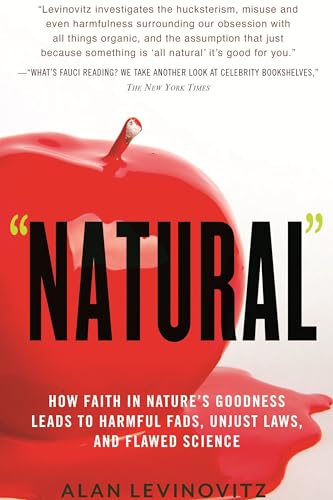Natural
How Faith in Nature's Goodness Leads to Harmful Fads, Unjust Laws, and Flawed Science
Alan Levinovitz
BOOK REVIEW

In a world saturated with organic labels and the promise of all things "natural," Natural: How Faith in Nature's Goodness Leads to Harmful Fads, Unjust Laws, and Flawed Science by Alan Levinovitz emerges as a riotous call for clarity amidst the chaos. Levinovitz pulls no punches in dissecting the seductive notion that nature is inherently good and infallible. In fact, he dives deep into the treacherous waters where this belief leads us-not to nirvana, but to absurd fads and potentially devastating policies.
Levinovitz, a scholar with a razor-sharp intellect, beckons us to question our blind faith in nature. It's a belief system that has wormed its way into our diets, our laws, and even our scientific discourse. The book unwraps the myth that natural equates to good, flipping it on its head with a clarity that's hard to ignore. What if those green juices and gluten-free cookies aren't the answer to all our problems? As Levinovitz demonstrates, clinging to these ideals can sometimes lead to more harm than good.
You might think that a book tackling such a dry topic could stifle your enthusiasm. Think again. Levinovitz writes not with a lecture's monotony but with the fervor of a storyteller and the bite of a provocateur. He illustrates how this unyielding faith in nature festers into harmful fads-think of organic marketing gimmicks and the allure of "natural" supplements that promise a lifetime of vitality but often deliver nothing more than a fancy placebo. It's a wild ride that reveals how societal cravings often overshadow rational thought.
But Levinovitz does more than just criticize. He shines a harsh light on the injustices that arise from our infatuation with the natural. Laws designed to protect our health often reflect this flawed reasoning. For instance, the demonization of synthetic substances, which can sometimes be safer than their natural counterparts, leads to regulations that might actually threaten public well-being. This isn't just about personal choice; it's a matter of collective responsibility.
The emotional weight behind Levinovitz's arguments resonates deeply. He makes it painfully clear that our misconceptions can justify discrimination and inequality. These "natural" ideologies affect policy-making in ways that disproportionately hit marginalized communities. As readers, we are confronted with the reality that our beliefs have concrete implications. The sheer audacity of this revelation may leave you shaken, as he invites you to reconsider not only what you buy but how you engage with the world around you.
Despite the weight of the subject, readers can't help but rave about Levinovitz's style. Some go as far as to call it intoxicating. His ability to weave historical insights into modern dilemmas makes Natural not just an academic treatise but a spicy social commentary. Critics implore everyone to dive into this work, regardless of their initial thoughts on the natural versus synthetic debate. The discourse it sparks is as vital as the content itself.
However, not everyone shares the adulation. Some detractors argue that Levinovitz's tone borders on hyperbolic. They claim that while he raises valid points, he sometimes sacrifices nuance for sensationalism. Yet, isn't that part of the allure? He forces us, perhaps uncomfortably, to confront our biases and the contradictions in our convictions.
As you leaf through Natural, a sense of urgency grips your heart. Levinovitz's journey through the psyche of society implores you to re-evaluate not just your dietary choices, but the very fabric of your beliefs. The stakes couldn't be higher. This isn't merely an exploration of ideas; it's a cultural reckoning, a challenge to the very principles that guide our decisions.
In writing this book, Levinovitz does more than educate; he preaches a gospel of skepticism, curiosity, and intellectual rebellion. And that's precisely why you need to read it-before you get swept away by another wave of natural fads or misguided laws. You owe it to yourself and your community to ask these hard questions, to question the unquestionable, and to grasp tightly to the truth that may be hiding in plain sight.
So, consider this your wake-up call. Will you continue to accept the comforting lies told by the society that cradles organic endorsement and natural narratives, or will you venture into the wild unknown of critical thought? Grab hold of Natural, and ignite the fire of inquiry within yourself. The insight it offers could transform not just your understanding, but your very existence. 🌍✨️
📖 Natural: How Faith in Nature's Goodness Leads to Harmful Fads, Unjust Laws, and Flawed Science
✍ by Alan Levinovitz
🧾 264 pages
2021
#natural #faith #natures #goodness #leads #harmful #fads #unjust #laws #flawed #science #alan #levinovitz #AlanLevinovitz